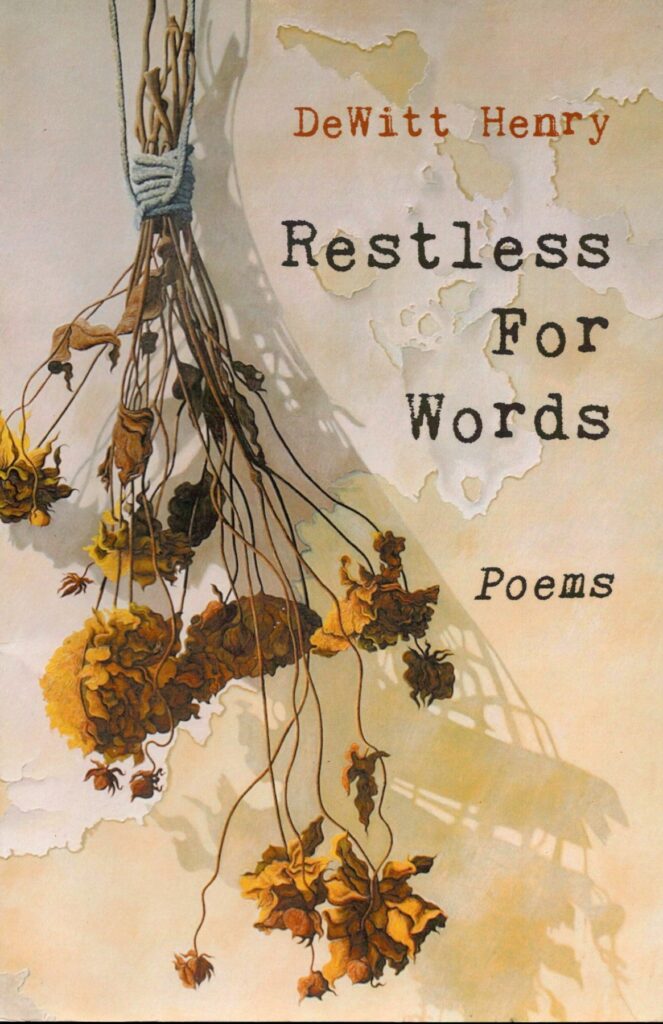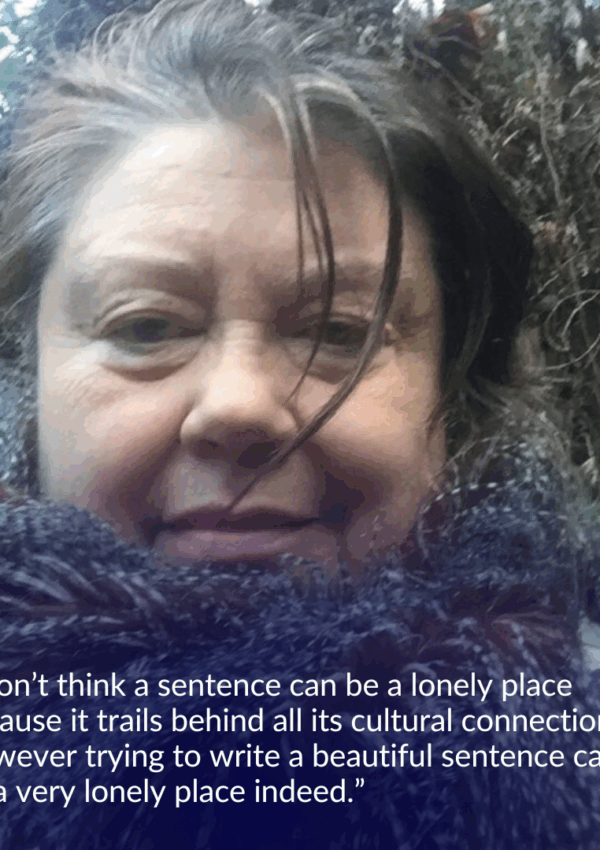I found DeWitt Henry’s poetry collection Restless for Words an accessible and relatable exploration of both language and “the problems of the human heart in conflict with itself” (to quote William Faulkner). Reflection on the book as a whole engaged my intellect, while the actual experience of reading each poem engaged my senses and my emotions.

The collection addresses a wide range of subject matter, including family, despair, tests of character, political candidates, ghosts, trees, and privacy, well-informed by scholarship in history, philosophy, and literature, particularly Shakespeare. The collection is also informed by keen observation of social culture, including the PPE of the COVID pandemic, those masks that muffle speech and remove facial expression from communication: “Nothing to read but eyes” (“On Faces,” p. 8).
The opening poem, “On Shadows,” sets the tone and approach for many of the poems in the collection, as the words we use have shadow selves—the connotations they have accrued through use, in addition to their derivation. The speaker first lets us inside his mind for some playful riffing on the word shadow:
Me and my shadow
Peter Pan lost his
a shadow of my former self
the Shadow knows ninety degrees in the shade
Henry, Pg 1.
A little over halfway through the poem, the wordplay shifts to personal memory with a poignant image of the speaker at a vulnerable place in his life:
At 22, a graduate student,
Lonely, life- and draft-deferred
I sat with my back to sun, relieved
to spy my head and shoulders
framed by blocks of light.
To have some substance. Self-
defined and fixed upon a life of thought.
Henry, Pg 1.
The poem then shifts to the present to describe the wonder the speaker’s older self experiences when observing shadows cast by a wicker basket leaning against a drainpipe: “one side aglow with the morning sun / while the other casts its filigree” (p. 2).
“On Shadows” ends by opening out to resonate with the reader: “Undreamt of transformations, / familiar yet strange” (p. 2).
In the poem that follows, “On Mapping,” the speaker comes to terms with his younger self in a way I found deeply moving:
There, that youth, so full of dreams
and arrogance, he can’t conceive
of this autumnal self, except
In scorn and disbelief. Could I comfort
or advise him? Can he sympathize, embrace?
Can we admit and wish each other well?
What else is memory, but mapping the heart?
Like feeling your way into a dark room, even if you’ve seen it once in light.
Henry, pg 5.
In addition to serving as an example of the moments of grace that occur throughout the collection, “On Memory” also exemplifies Henry’s highly skilled use of the line break. Without exception, each line is broken in exactly the right place, with the reader’s experience of the poem in mind.
What I most appreciated after reading and reflecting on the individual poems and the collection as a whole, was being challenged-–even as a writer—to confront how easy it is to take language for granted. Too many times we fail to see, or even look for, the shadow selves of the words we speak, the words we hear, the words we write, and the words we read.
The best description of what readers can expect from Restless for Words comes in the final stanza of “On Glamor”:
“As for poetry, well,
Long live the vernacular.
The language of real people.
Forgo the makeup and jargon. Look in thy heart and write.”
Henry, Pg. 57
In this extraordinary collection, DeWitt Henry does just that, and I thank him for it.

Elizabeth Gauffreau writes fiction and poetry with a strong connection to family and place. Her work has been widely published in literary magazines, as well as several themed anthologies. Her short story “Henrietta’s Saving Grace” was awarded the 2022 Ben Nyberg prize for fiction by Choeofpleirn Press.
She has published a novel, Telling Sonny, and a collection of photopoetry, Grief Songs: Poems of Love & Remembrance. She is currently working on a novel, The Weight of Snow and Regret, based on the closing of the last poor farm in Vermont in 1968.
Liz’s professional background is in nontraditional higher education, including academic advising, classroom and online teaching, curriculum development, and program administration. She received the Granite State College Distinguished Faculty Award for Excellence in Teaching in 2018. Liz lives in Nottingham, New Hampshire with her husband. Find her online at https://lizgauffreau.com.



